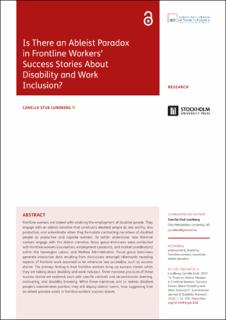Is There an Ableist Paradox in Frontline Workers’ Success Stories About Disability and Work Inclusion?
Peer reviewed, Journal article
Published version
Permanent lenke
https://hdl.handle.net/11250/3058736Utgivelsesdato
2022Metadata
Vis full innførselSamlinger
Originalversjon
Scandinavian Journal of Disability Research. 2022, 1-14. https://doi. org/10.16993/sjdr.838Sammendrag
Frontline workers are tasked with enabling the employment of disabled people. They engage with an ableist narrative that constructs disabled people as less worthy, less productive, and subordinate when they formulate contrasting narratives of disabled people as productive and capable workers. To better understand how frontline workers engage with the ableist narrative, focus group interviews were conducted with frontline workers (counsellors, employment specialists, and market coordinators) within the Norwegian Labour and Welfare Administration. Focus group interviews generate interaction data resulting from discussions amongst informants revealing aspects of frontline work assumed to be otherwise less accessible, such as success stories. The primary finding is that frontline workers bring up success stories when they are talking about disability and work inclusion. Three narrative practices of these success stories are explored, each with specific contexts and circumstances: learning, motivating, and disability branding. While these narratives aim to redress disabled people’s subordinated position, they still display ableist norms, thus suggesting that an ableist paradox exists in frontline workers’ success stories.

